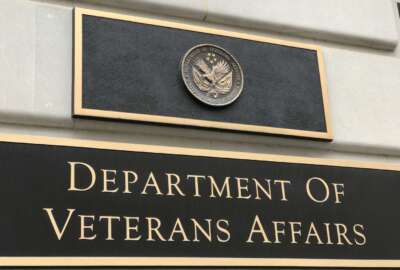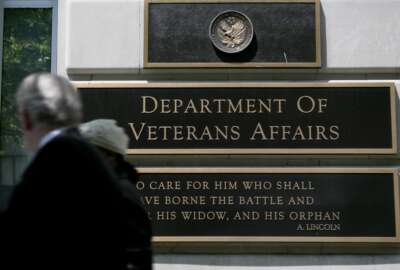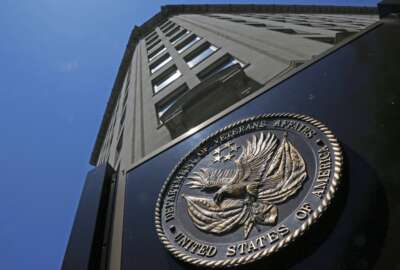

The largest federal employee union warns the Department of Veterans Affairs isn’t doing enough to recruit and retain the workforce it needs to keep up with the...
The largest federal employee union warns the Department of Veterans Affairs isn’t doing enough to recruit and retain the workforce it needs to keep up with the demand for VA health care and benefits, despite the agency reporting record hiring this year.
The American Federation of Government Employees (AFGE) released a report Tuesday detailing the results of a survey sent to its bargaining unit employees.
AFGE’s National VA Council and the Veterans Healthcare Policy Institute (VHPI) sent the survey questionnaire in spring 2022 to 90,000 VA employees that AFGE represents. About 2,000 employees responded to the survey.
Nearly all survey respondents working in the Veterans Health Administration said they agreed their facilities need more frontline clinical staff, while 77% of those VHA respondents said they needed more administrative staff.
About 77% of respondents said there are vacant positions where there is no recruitment taking place.
AFGE is releasing its survey results at a time when the VA is reporting a record rate of hiring across its health care and benefits workforce.
VHA’s total workforce grew by 9,590 employees in the first five months of fiscal 2023 — a 2.5% increase. That’s the agency’s highest growth rate in more than 20 years. VHA also nearly cut its attrition rate in half, compared to 2022.
Meanwhile, the Veterans Benefits Administration’s total workforce has grown by 1,369 employees, or more than 5%, in the first four months of fiscal 2023 — the highest growth rate in the past 20 years.
Both VHA and VBA expect to meet, if not exceed, their hiring goals for fiscal 2023.
VA Press Secretary Terrence Hayes said the VA under the PACT Act has added more than 10 new authorities to support hiring and retention. Those include higher limits for student loan repayments; recruitment, relocation and retention incentives; and eliminating statutory limits on awards and bonuses.
While the VA is already implementing some of its PACT Act incentives, such as expanded student loan repayment, Hayes said the VA is planning to implement some of its remaining PACT Act authorities later this spring.
These efforts build on additional efforts from last year, including raising wages for nearly 10,000 VA nurses under the RAISE Act.
“Despite this progress, there is still much work to do — and we at VA will not rest until every VA employee has the resources they need to feel supported and deliver world-class care and benefits to veterans, their families, caregivers and survivors,” Hayes said.
The PACT Act gives the VA greater capacity to offer recruitment and retention incentives to in-demand health care employees, but AFGE officials said the agency isn’t making full use of those authorities.
The PACT Act also allows the VA to offer recruitment, retention and relocation incentives that are worth up to 50% of an employee’s salary, and the legislation allows VA to pay out those incentives upfront in a lump sum.
But Linda Ward-Smith, president of AFGE Local 1224 in Las Vegas, said the VA in some cases has not paid out the sign-up bonuses promised to new hires.
“If we’re not paying people what they were committed to being paid when they come into the VA, then definitely they’re going to leave. We have promises made, but they’re not kept with a lot of our providers,” Ward-Smith said. “They’re offering sign-on bonuses, but then the VA is allowed to not pay those bonuses, based on crazy laws that affect doctors and nurses.”
Ward-Smith said the VA needs to offer higher salaries than what it’s offering to fill more than 1,000 vacancies in the region.
“Salaries are just not competitive in our market, where we able to retain [VA] employees for the amount of stuff that we’re putting on them because of the staffing levels that we don’t have,” she said.
The VA under the legislation can now offer employees up to $100,000 in student loan repayment over the course of their careers — or up to $40,000 per year.
But Barbara Galle, president of AFGE Local 3669 in Minneapolis, said local VA management has “perhaps too much discretion” on how those bonuses are paid out.
“What we’re seeing in the northwest is, ‘OK, you have a student loan for $40,000, and the VA is going to give you a check, but we’re going to tax that $40,000 — but you still have to pay the full $40,000, even though we said we were going to give you that money,” Galle said.
VHPI Senior Policy Analyst Suzanne Gordon said the VA is focused on offering PACT Act incentives to recruit new hires, but said the agency is less focused on offering retention incentives to the current VA workforce.
“There’s just limited resources in many cases,” she said.
Gordon added that the VA, prior to the PACT Act being signed into law in August 2022, was offering retention allowances that had not yet been authorized.
“They were offering a lump sum on the front end, and they couldn’t do that until the PACT Act passed … When you get burned and [they] say, ‘This is the deal. Oh no, this is not the deal — this is really the deal,’ it seems like it’s gimmickry and they can walk out the door,” Gordon said.
While the VBA is also ramping up hiring, AFGE officials said the agency isn’t preparing new hires and its current workforce to handle PACT Act claims.
More than 60% of survey respondents working in VBA said they were considering leaving their jobs in the next few years, due to understaffing and unrealistic work metrics.
David Bump, vice president of AFGE Local 2157 in Portland, Oregon, said the VBA isn’t giving its workforce the training they need to handle PACT Act claims.
“I can’t say anything good about the training we’ve gotten on the PACT Act — absolutely nothing. It’s inconsistent from station to station,” Bump said.
Bump said VBA employees, as initial training to handle PACT Act claims, were originally given several slides on the agency’s talent management system. He said the VBA later released an 80-page document outlining the standard operating procedure for PACT Act claim.
“I’ve spoken with some of my counterparts in offices across the country where employees were given two hours to read that, and expected to know every little aspect of it,” Bump said, adding that other VBA posts were given several days to review the material.
Bump said the training problems are more acute for new VBA hires.
“While they may be hiring at what they would call record levels, it takes a long time to learn how to do this work. It’s very, very complex,” he said. “When I got hired, they said it would be four years before you felt comfortable doing your work. Well, now they say that’s two years.”
Half of the survey respondents said VA’s Human Resources Modernization initiative, which began under the Trump administration, has contributed to recruiting and retention challenges.
More than 90% of respondents said HR delays had deterred interested candidates.
“When we put an advertisement out, hundreds of people apply, but by the time they make that offer, they’re already gone,” Ward-Smith said.
February marks the first month so far this fiscal year that the VHA reduced its time-to-hire. VA Secretary Denis McDonough said last fall that the agency is taking 90-100 days to onboard candidates that have been selected to fill a position.
More than half of VHA survey respondents said they have less time to deliver direct patient care and support services than they did four years ago.
“What you see is people coming in and saying, ‘I saw a patient, and I didn’t follow up with him sometimes until like three weeks, four weeks [later],” said Mary-Jean Burke, the first executive vice president of AFGE’s National VA Council.
Gordon said the VA may be hiring, but said the agency is also shifting some staff away from frontline patient care to handle referrals for non-VA community care,
The report finds that the budget for community care has increased by 116% between 2017 and 2021, while the budget for in-house VA care increased by 32% in the same period of time.
“If you pull two psychologists off delivering therapy to patients — that’s 60-to-90 appointments a week that you’re missing. These things have to go hand in hand,” Gordon said.
Copyright © 2025 Federal News Network. All rights reserved. This website is not intended for users located within the European Economic Area.
Jory Heckman is a reporter at Federal News Network covering U.S. Postal Service, IRS, big data and technology issues.
Follow @jheckmanWFED



